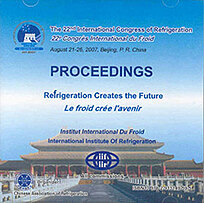
Document IIF
Congélation des cellules d'ostéoblastes adhérant à des disques en hydroxyapatite et à des couvercles en verre : mécanismes de l'altération due au froid.
Freezing osteoblast cells attached to hydroxyapatite discs and glass coverslips: mechanisms of damage.
Auteurs : LIU B. L., MCGRATH J.
Résumé
Damage mechanisms for osteoblast cells attached to hydroxyapatite discs and glass coverslips were comprehensively investigated. The inverse U shape curves of survival versus cooling rates were obtained with the maximum survival much lower than that of isolated osteoblast cells. Cell-cell, cell-matrix interaction may alter the cryobiological properties of cells. Attached cells were subject to more severe mechanical forms damage than isolated cells because attached cells have larger contacting area with ice and the three dimension movements of isolated cells make them more flexible than attached cells that can only deform in one dimension. Results show that solute effects result in cells injury at slow cooling rate (1°C/min), while extracellular ice, differential thermal contraction, and mechanical stresses damaged the cells at high cooling rate (5, 10, 20°C/min). No intracellular ice formation was found in this study. The immunostaining of actin filaments can qualitatively reveal the mechanical damage. It may be possible to quantitatively relate the cell survival to their spreading area.
Documents disponibles
Format PDF
Pages : ICR07-C1-1329
Disponible
Prix public
20 €
Prix membre*
Gratuit
* meilleur tarif applicable selon le type d'adhésion (voir le détail des avantages des adhésions individuelles et collectives)
Détails
- Titre original : Freezing osteoblast cells attached to hydroxyapatite discs and glass coverslips: mechanisms of damage.
- Identifiant de la fiche : 2007-2826
- Langues : Anglais
- Source : ICR 2007. Refrigeration Creates the Future. Proceedings of the 22nd IIR International Congress of Refrigeration.
- Date d'édition : 21/08/2007
Liens
Voir d'autres communications du même compte rendu (839)
Voir le compte rendu de la conférence
Indexation
- Thèmes : Influence du froid sur les cellules, tissus et organes
- Mots-clés : Glace; Cellule; DMSO; Os; Cryoconservation; Cryocongélation; Cristallisation
-
VISUALIZATION OF FREEZING DAMAGE TO BIOLOGICAL ...
- Auteurs : ENGLICH S., KORBER C., RAU G.
- Date : 24/08/1987
- Langues : Anglais
- Source : Development in refrigeration, refrigeration for development. Proceedings of the XVIIth international Congress of Refrigeration.
- Formats : PDF
Voir la fiche
-
Surface markers of colony forming marrow cells ...
- Auteurs : SUMIDA S., KITAMUEA T., MOTOMURA N., et al.
- Date : 21/08/2011
- Langues : Anglais
- Source : Proceedings of the 23rd IIR International Congress of Refrigeration: Prague, Czech Republic, August 21-26, 2011. Overarching theme: Refrigeration for Sustainable Development.
- Formats : PDF
Voir la fiche
-
Effect of DMSO-free cryopreservation on MSCS os...
- Auteurs : ROGULSKA O., PETRENKO Y., LOZINSKY V., et al.
- Date : 08/09/2016
- Langues : Anglais
- Source : 2nd IIR Workshop on cold applications in life sciences.
- Formats : PDF
Voir la fiche
-
Special equipment for cryopreservation of tissu...
- Auteurs : SPÖRL G., KLINGNER E., QUINGER J.
- Date : 21/04/2008
- Langues : Anglais
- Source : Cryogenics 2008. Proceedings of the 10th IIR International Conference
- Formats : PDF
Voir la fiche
-
Kryokonservierung und Langzeitlagerung von Nabe...
- Auteurs : EGGER D.
- Date : 18/11/2009
- Langues : Allemand
- Source : Deutsche Kälte-Klima-Tagung: 2009, Berlin.
Voir la fiche
